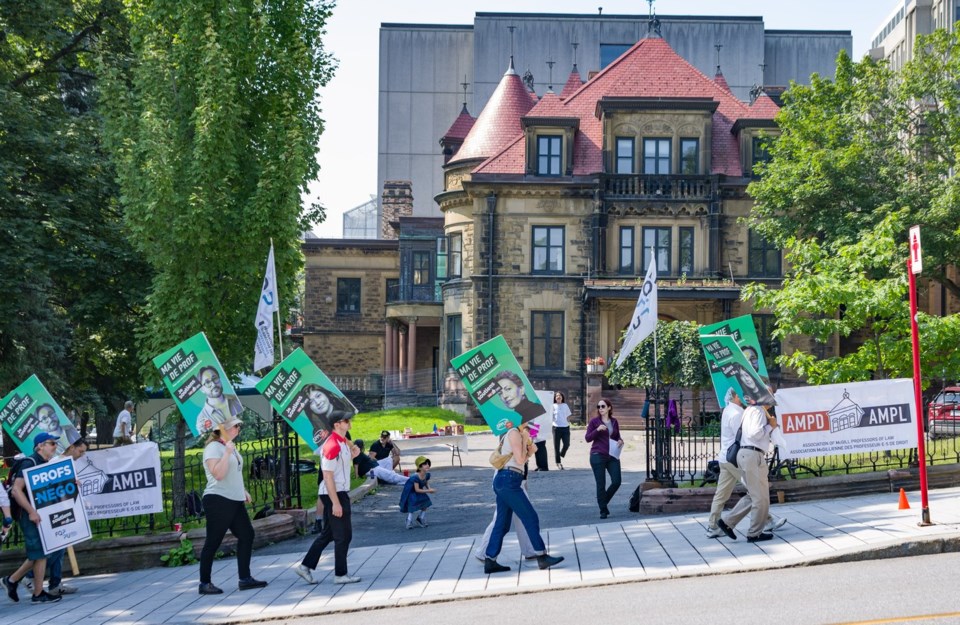MONTREAL — Quebec's labour tribunal has ordered McGill University to stop obstructing and interfering with a union representing full-time law professors amid an ongoing strike over what the union says is the faculty's right to unionize.
The tribunal found the university appears to have violated the Quebec Labour Code when its administration sent two emails to law professors criticizing the union, according to an Aug. 30 decision. The emails were sent to law faculty in the days before they decided to resume an unlimited strike coinciding with the start of classes.
The union demonstrated that McGill was "seeking to influence its members on the eve of a general meeting," the ruling states. The tribunal found the two emails attempted to "undermine the union's credibility" at a particularly sensitive moment and it ordered McGill to inform the union before any future communication with law professors.
The tribunal's ruling is a temporary order, with a full hearing on the matter scheduled for later this month.
The decision is a "remarkable turn of events," said McGill law professor Richard Janda, who is the secretary and chief negotiator for the Association of McGill Professors of Law.
"It’s the first time that we’ve had such a clear statement from the tribunal that the university is acting in an anti-union fashion and is violating the law,” Janda said.
The two emails contained messages from McGill provost Christopher Manfredi and Fabrice Labeau, vice-president of administration and finance, and were sent to law professors by faculty dean Robert Leckey. The first was sent on Aug. 21 and included an explanation of why McGill had withdrawn from negotiation sessions. The tribunal found it included "tendentious comments that criticize the union's approach."
A second email was sent the following day. Manfredi and Labeau said they wanted to correct a document sent by the union to its members comparing different pension plans. The email claimed the union document "contains numerous factual errors, omissions and misrepresentations."
A union meeting had been scheduled for Aug. 23, when faculty members would decide whether to resume a strike that began last spring. The timing of the emails from McGill administration was "not coincidental," Janda claimed.
The tribunal ordered McGill "to cease all forms of obstruction and to refrain from interfering in union affairs in any way whatsoever," and to "cease communicating directly" with union members "other than with a factual, neutral report."
In a statement, McGill said it will abide by the interim order pending the hearing later this month.
"McGill is aware of the constraints on an employer's speech with unionized employees and believes that it has complied with those constraints in all communication with its professors represented by AMPL," the statement reads.
Despite the emails, law professors decided to go back on strike during the Aug. 23 meeting. The tribunal decision says the union members held a strike vote during that meeting, but Janda later clarified the union already had a strike mandate from the spring, so no vote was required. Instead, members unanimously agreed to resume the strike, which began Aug. 26.
The union, which includes more than 40 professors, is demanding better pay and more involvement in the faculty's governance, but Janda said a key concern is the faculty's right to unionize.
The labour tribunal certified the law professors' union in November 2022, but the union has yet to secure its first collective agreement. The university plans to challenge the union's certification before the Quebec Superior Court in December.
Janda believes the university is trying to delay negotiations until the hearing, and he said professors won't return to work until McGill drops its legal challenge.
“If McGill is prepared to drop its attempt to decertify the union, we can be back in the classroom within the day,” he said.
Law professors held a two-month strike after classes ended last spring, but this time around the union has opted for a more disruptive approach. Classes were supposed to start last Wednesday.
McGill's law faculty is the first group of professors to unionize at the university, though most non-faculty staff are unionized. Since the law faculty union was formed, professors in the faculties of education and arts have also filed for union certification.
Janda said the law professors' fight will determine "the future of unionization at McGill," and said the university is trying to quash the movement.
"McGill's objective seems to be not just to negotiate hard with us but actually to defeat unionization at McGill and to behave in such a way as to put an end to our existence,” he said. "And we know that other faculties are watching to see what will happen.”
This report by The Canadian Press was first published Sept. 2, 2024.
— With files from Joe Bongiorno
Maura Forrest, The Canadian Press



